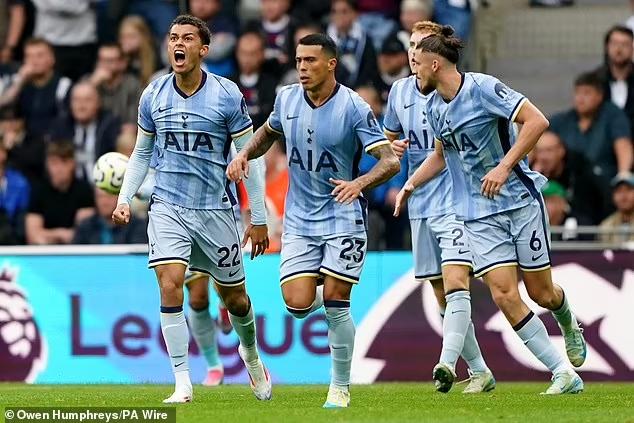
Alasdair Gold has provided his insights on Djed Spence’s omission from Tottenham’s Europa League squad, which has raised eyebrows among fans and pundits alike.
The decision has sparked debate, especially considering the North London club’s lackluster start to the new season. Tottenham have only won one of their first three Premier League matches, leaving fans concerned about their form. However, with important fixtures on the horizon, including a clash with arch-rivals Arsenal after the international break, there is hope for a turnaround. Spurs are also preparing for their Europa League opener against Qarabag, but the decision to exclude Spence from the squad has caused further speculation.
In a Q&A session with fans on Football London, Alasdair Gold discussed the omission of Spence and questioned the rationale behind the decision. Gold noted that Spence had impressed the coaching staff during pre-season, including head coach Ange Postecoglou, making his exclusion all the more surprising.
Gold explained: “Spence has done really well this summer and impressed everyone inside the club, including Postecoglou. I think he’s just been really unfortunate in that the squad choice would suggest the Spurs boss does not trust his backup goalkeeper options enough to leave out the experienced Fraser Forster. That means Spence was the odd man out.”
The omission of Spence appears to be a tactical decision based on squad balance, as Tottenham must adhere to UEFA’s squad regulations, which limit the number of non-homegrown players. However, Gold highlighted that this decision could backfire. Spurs already face a shortage of defensive cover, and the suspension of Cristian Romero for their first Europa League match against Qarabag only adds to the problem.
Gold elaborated on the risks involved: “It’s a very risky decision because it leaves the defensive cover very light for the group stages. Romero is suspended for the first game against Qarabag, and an injury or two more and there’s going to be some problems. Spence was able to cover both right and left-back spots.”
Spence’s versatility is one of his most valuable attributes, as he can operate on both flanks, providing essential cover in a position where Tottenham are already short-handed. Leaving him out of the Europa League squad could be seen as a missed opportunity, as Spence would likely have played a crucial role in the competition.
Gold also speculated on how Spence would handle the situation. Despite his omission, Spence has been involved in two of Tottenham’s three Premier League games this season and is expected to feature in the Carabao Cup. However, the exclusion from Europe still feels like a significant blow.
Gold remarked: “How the 24-year-old will react is going to be interesting. He’s come on in two of the first three Premier League games and will likely play in the Carabao Cup, so he should still get game time. It’s just a massive shame because he would have played a lot in Europe.”
Spence’s situation is emblematic of a larger issue within Tottenham’s squad management. The club has faced challenges with assembling a balanced squad that meets UEFA’s homegrown player requirements. The fact that Tottenham currently do not have a single outfield player in their first-team squad who was club-trained has compounded the problem. This oversight has forced them to make tough decisions, such as leaving Spence out of the Europa League squad in favor of backup goalkeeper Fraser Forster.
Gold didn’t hold back in expressing his concern over this situation, stating: “Overall, it’s a big red flag against the squad management Spurs have overlooked in recent years with not a single outfield club-trained player in the first team now. They have made moves to change that, but it’s been a problem they should have sorted a long time ago.”
The lack of locally trained players has come back to haunt Tottenham in this situation, as the club must juggle its senior squad to meet UEFA regulations. The decision to include Forster over Spence underscores the management’s unease with their goalkeeping options. It’s a choice that could leave Spurs exposed defensively, particularly with Romero suspended for the opening game against Qarabag.
Spence’s exclusion also raises questions about Tottenham’s long-term planning. Despite showing promise in pre-season and earning minutes in the Premier League, Spence’s development may be stunted if he is not given consistent opportunities to play in important fixtures. The Europa League would have been an ideal platform for him to gain more experience, especially given the intensity and demands of the competition.
Ange Postecoglou’s decision to leave Spence out of the squad could also have implications for squad morale. Spence has worked hard to impress during pre-season, and his omission may be seen as a setback, particularly given his versatility and potential to fill multiple roles in defense.
However, Gold remained optimistic about Spence’s future involvement, suggesting that the defender will still have opportunities to contribute in other competitions, such as the Carabao Cup. But it’s clear that missing out on Europa League action is a missed opportunity for Spence to further his development and establish himself as a regular first-team player.
As Tottenham look ahead to a crucial stretch of fixtures, the decision to omit Spence from the Europa League squad may prove to be a significant one. With key defensive players missing and a challenging fixture list ahead, Spurs’ squad depth will be tested. Whether Postecoglou’s gamble on Forster over Spence pays off remains to be seen, but the decision has certainly raised concerns about Tottenham’s squad management and long-term planning.
In the end, Spence’s omission highlights the delicate balancing act that managers must perform when assembling their squads for European competition. For Tottenham, the decision to leave out one of their most promising young defenders could have lasting repercussions, particularly if injuries or suspensions take their toll during the Europa League group stages.
Leave a Reply